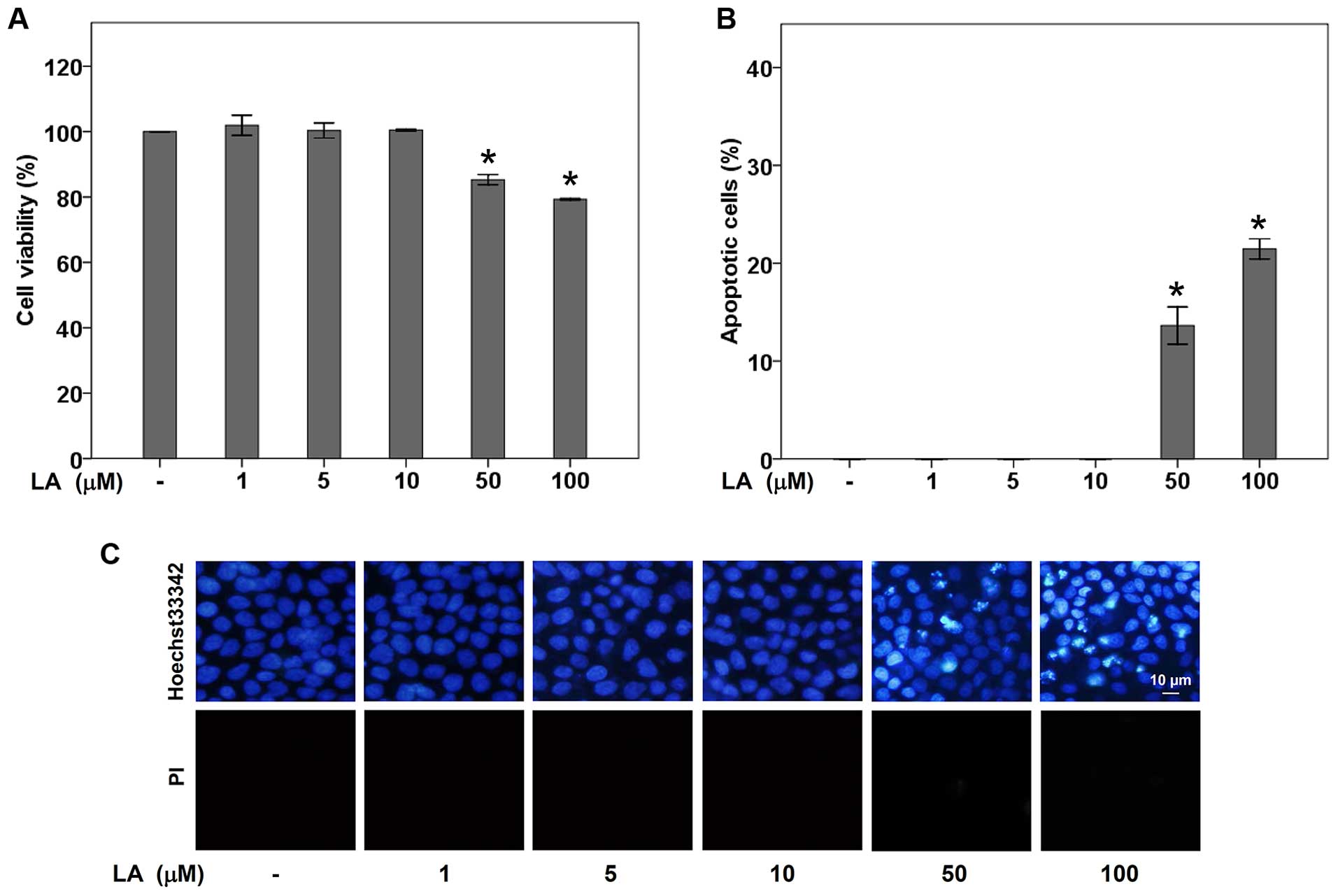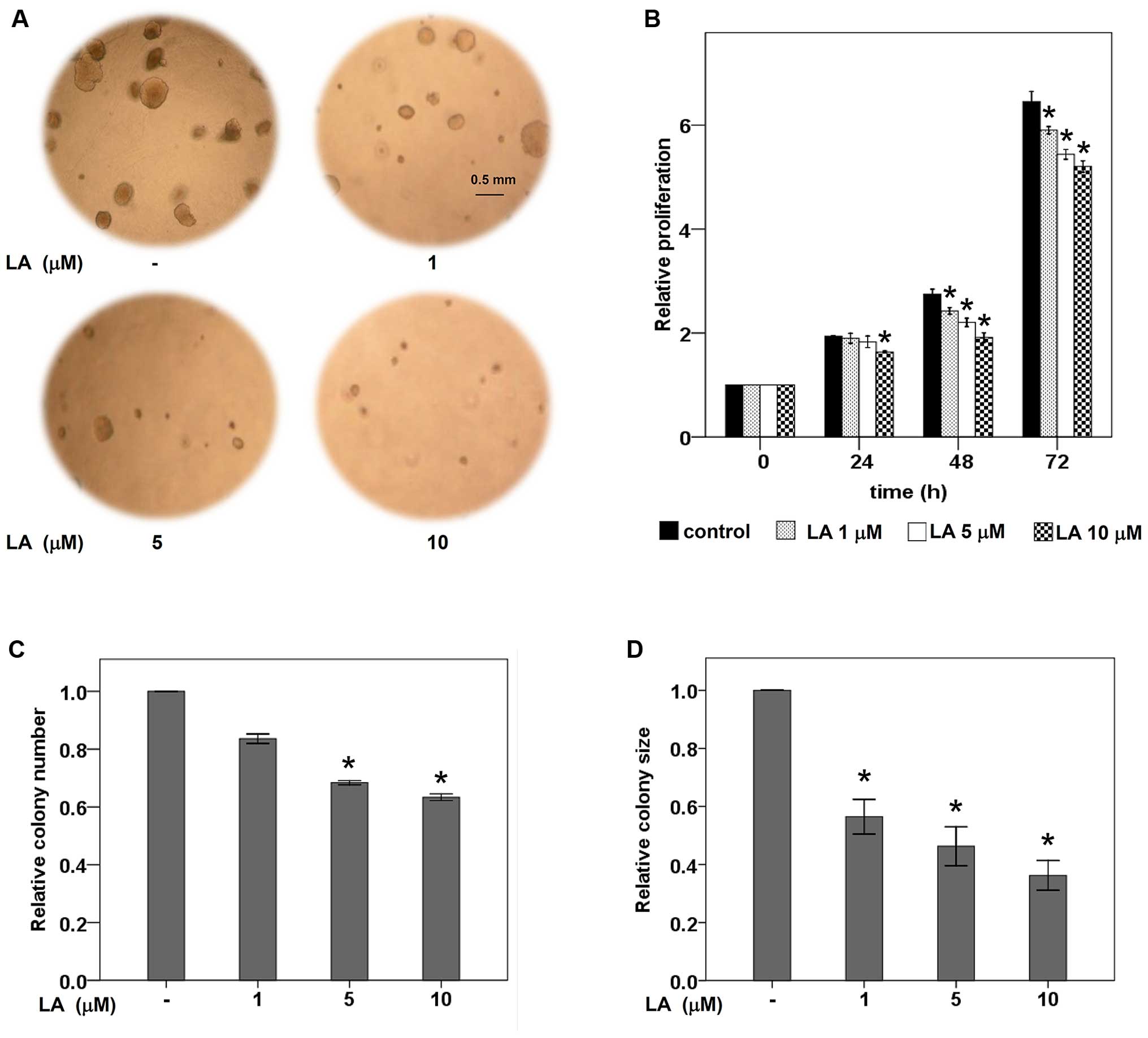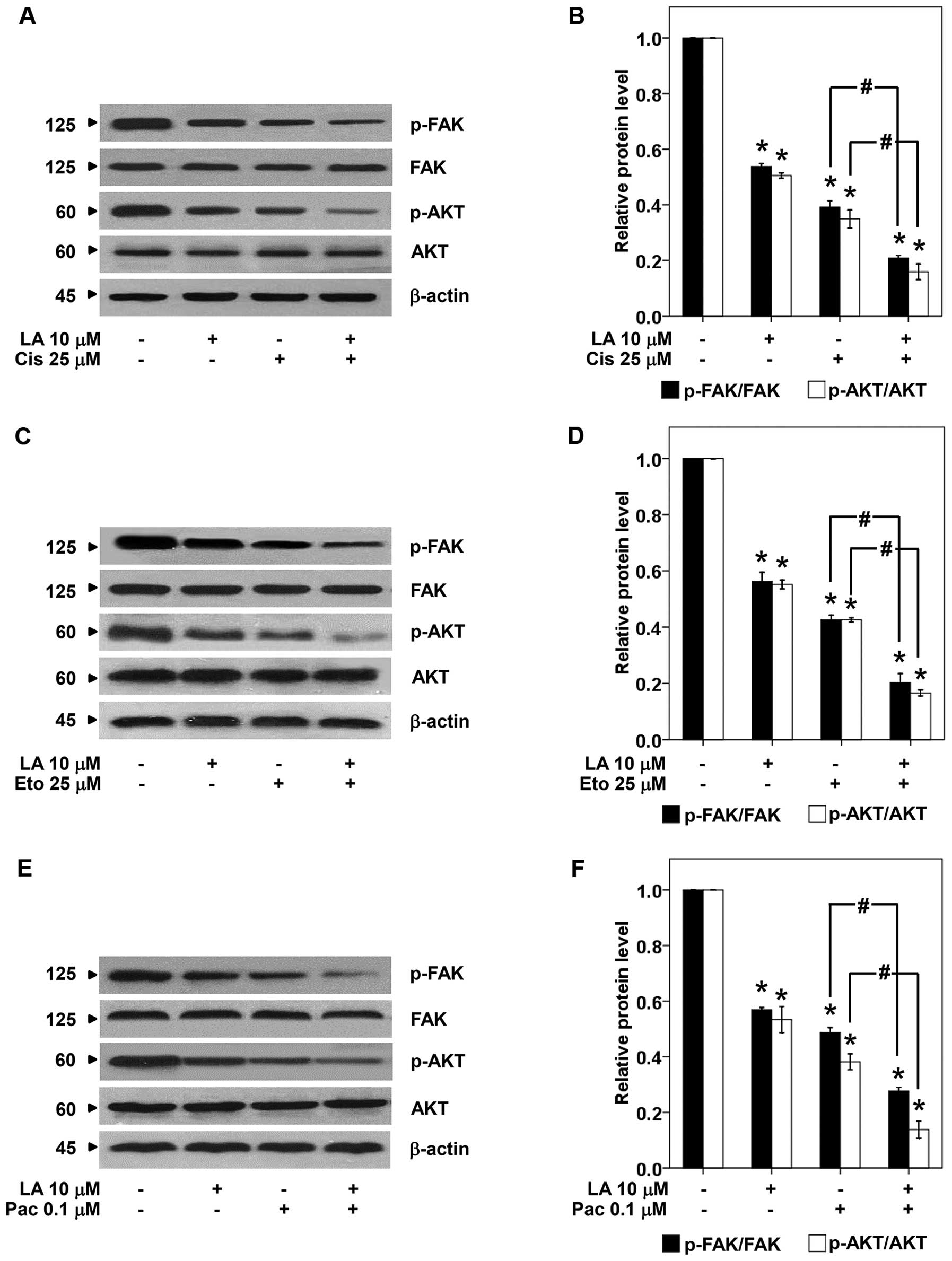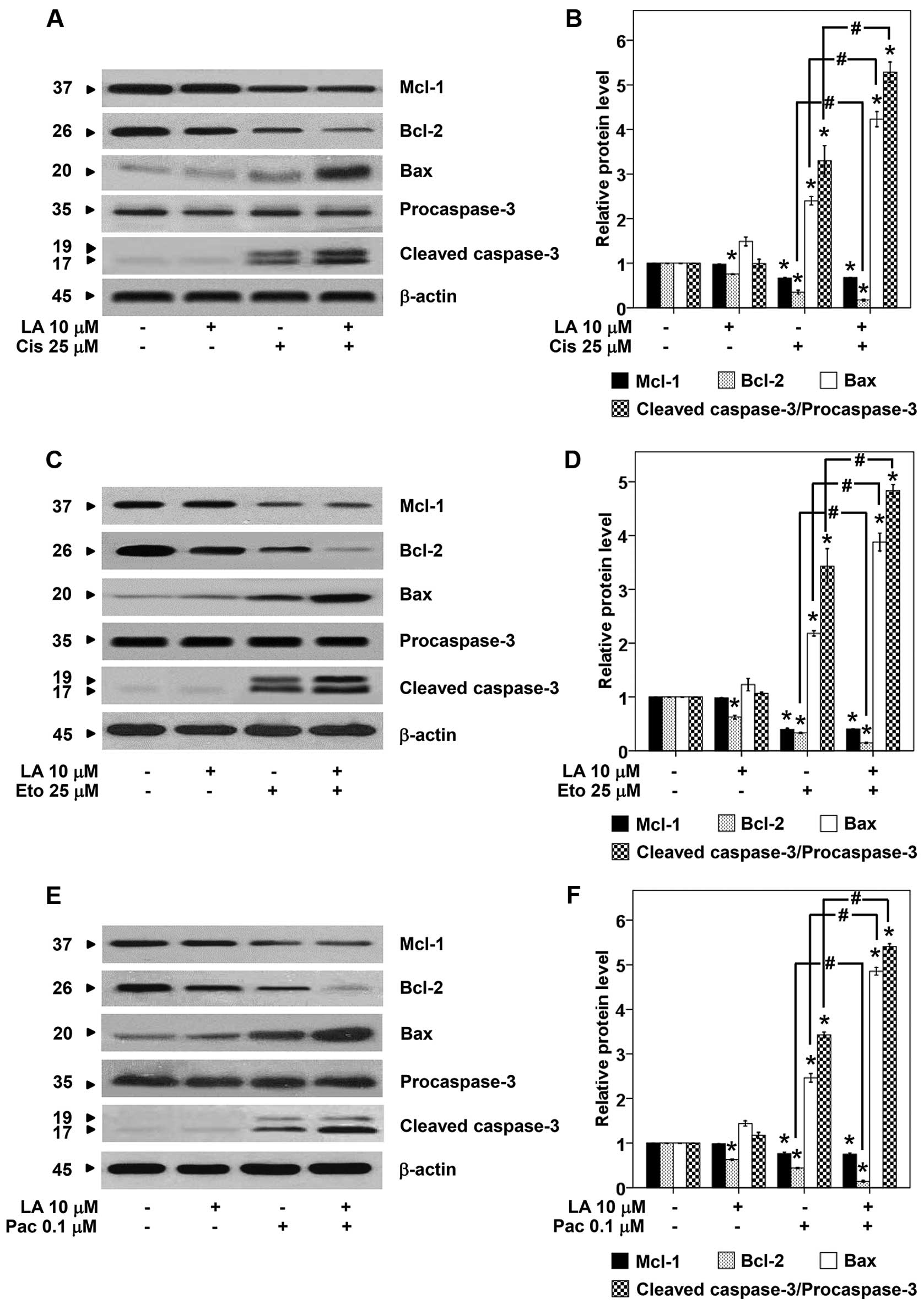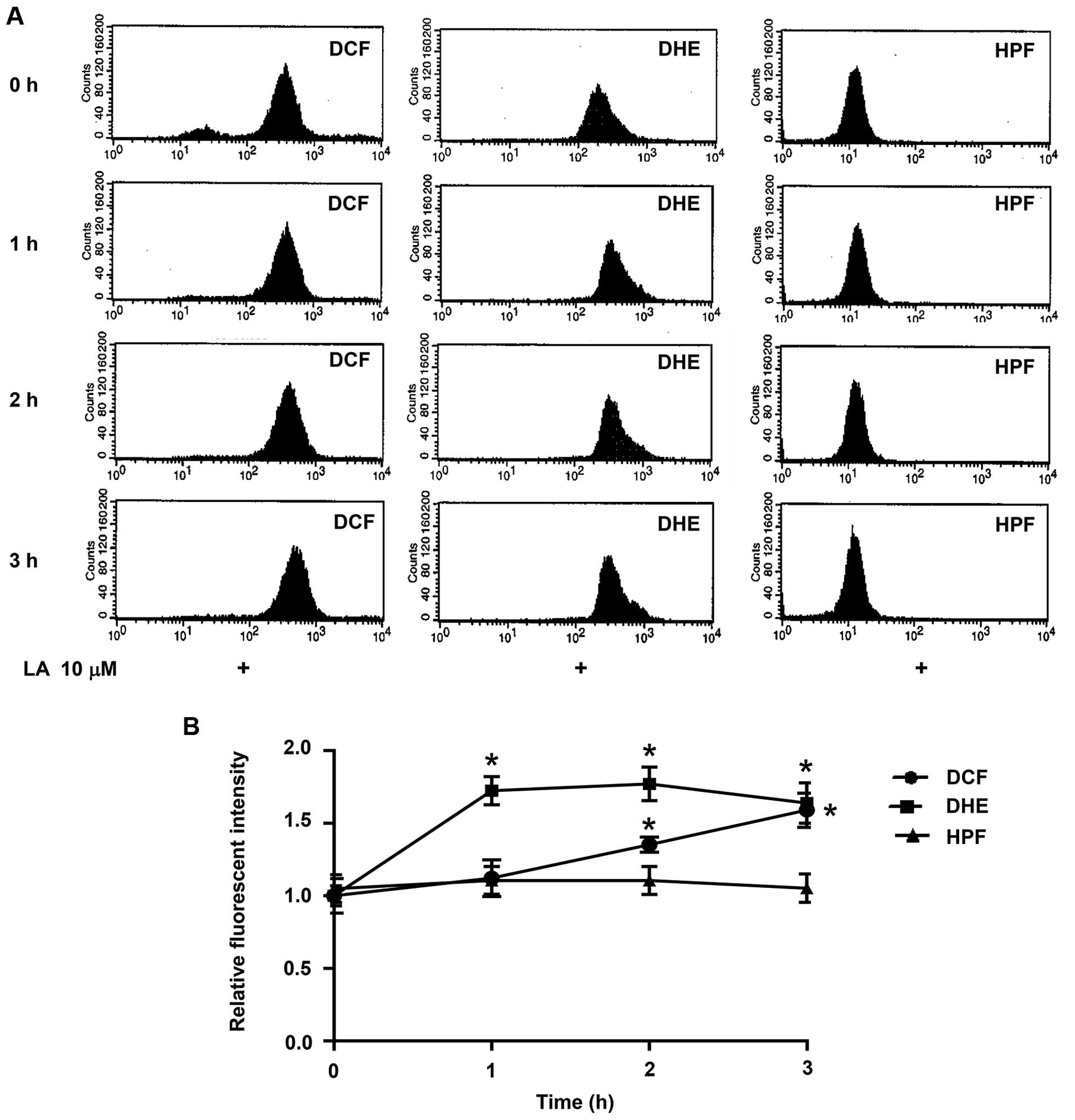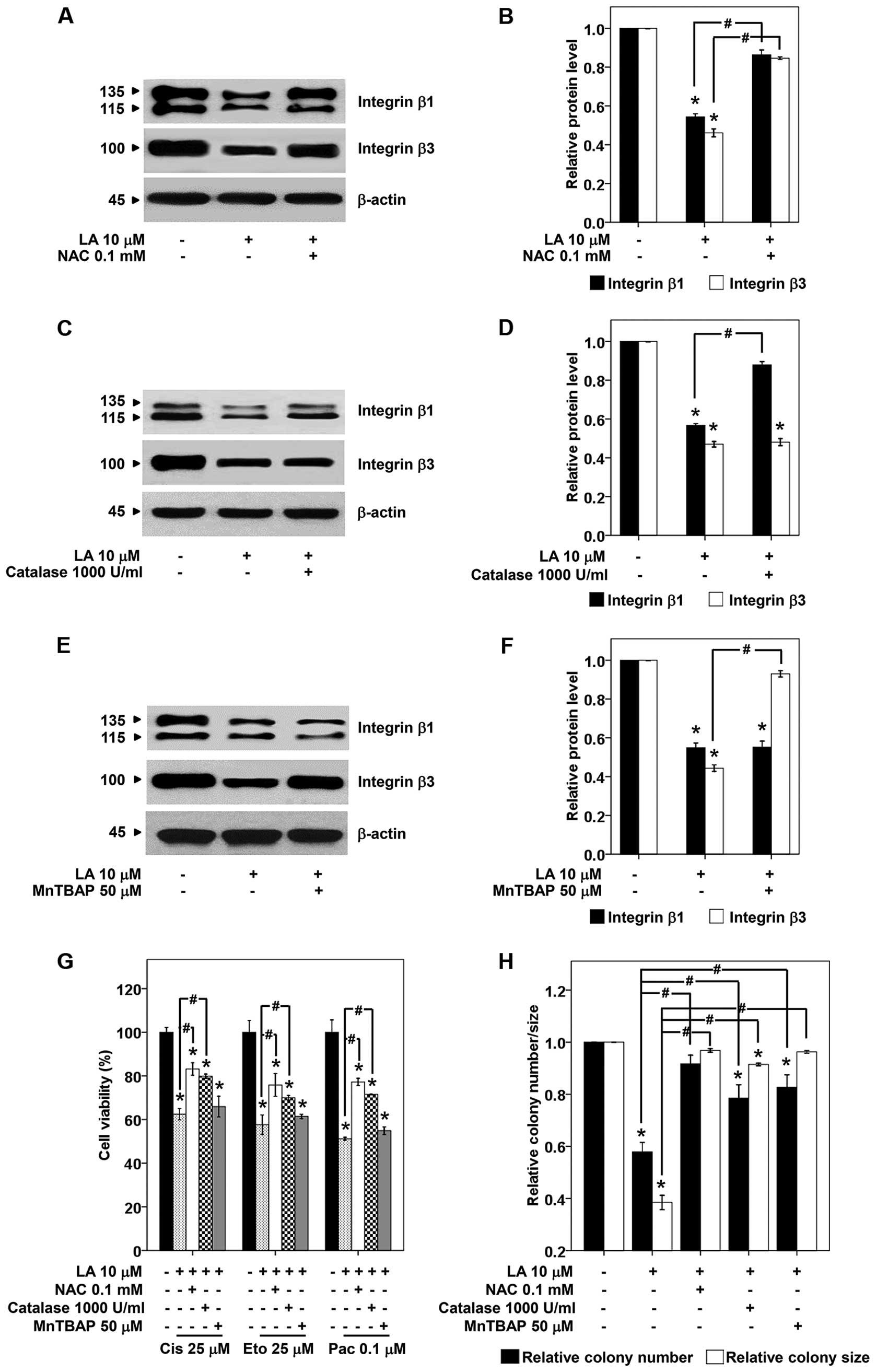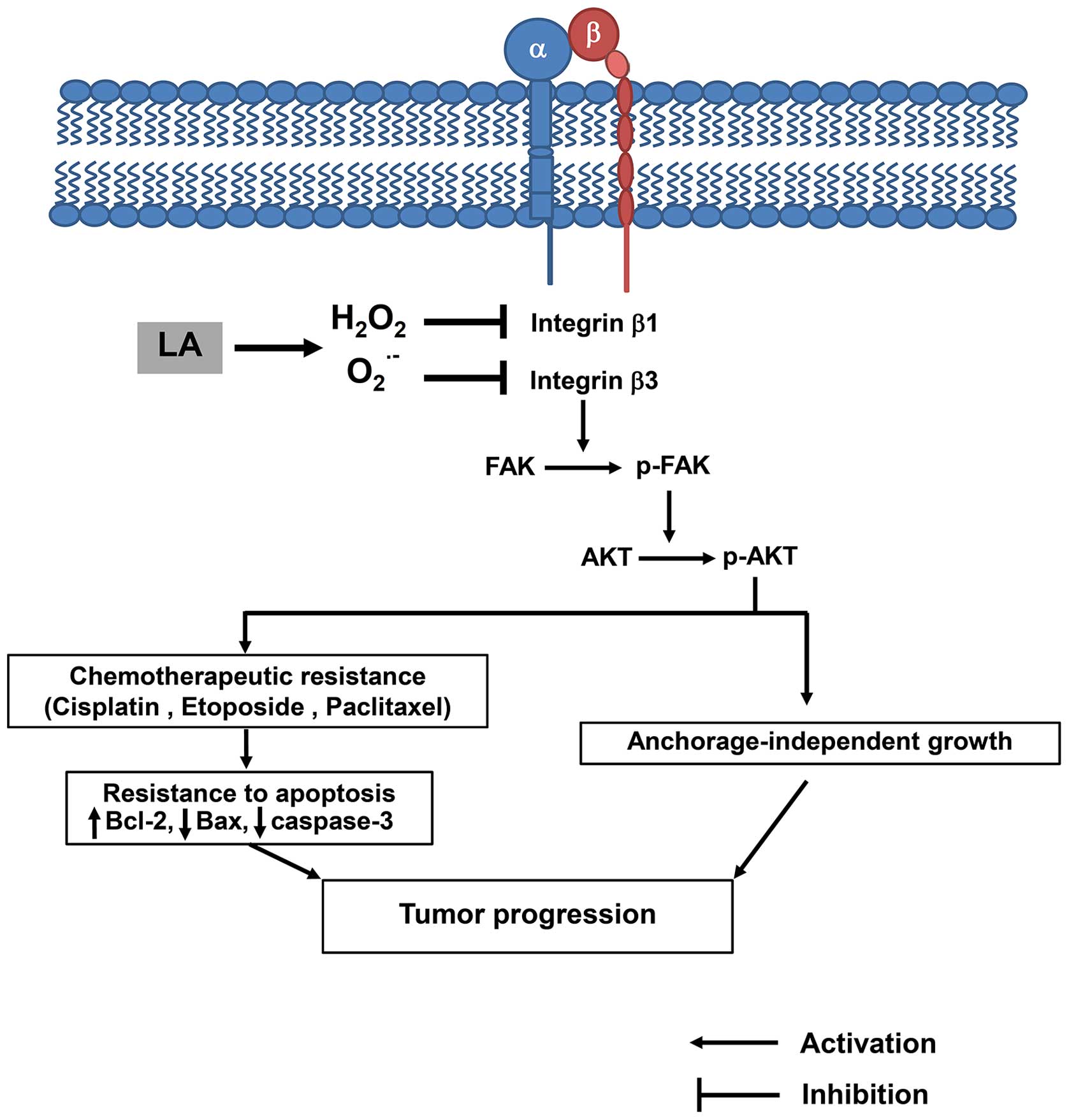|
1
|
Molina JR, Yang P, Cassivi SD, Schild SE
and Adjei AA: Non-small cell lung cancer: Epidemiology, risk
factors, treatment, and survivorship. Mayo Clin Proc. 83:584–594.
2008. View Article : Google Scholar : PubMed/NCBI
|
|
2
|
Hunter KW, Crawford NPS and Alsarraj J:
Mechanisms of metastasis. Breast Cancer Res. 10(Suppl 1): S2. 2008.
View Article : Google Scholar :
|
|
3
|
Merk J, Rolff J, Dorn C, Leschber G and
Fichtner I: Chemoresistance in non-small-cell lung cancer: Can
multidrug resistance markers predict the response of xenograft lung
cancer models to chemotherapy? Eur J Cardiothorac Surg. 40:e29–e33.
2011. View Article : Google Scholar : PubMed/NCBI
|
|
4
|
Paoli P, Giannoni E and Chiarugi P:
Anoikis molecular pathways and its role in cancer progression.
Biochim Biophys Acta. 1833:3481–3498. 2013. View Article : Google Scholar : PubMed/NCBI
|
|
5
|
Igney FH and Krammer PH: Death and
anti-death: Tumour resistance to apoptosis. Nat Rev Cancer.
2:277–288. 2002. View
Article : Google Scholar : PubMed/NCBI
|
|
6
|
Liu Q-H, Shi M-L, Sun C, Bai J and Zheng
J-N: Role of the ERK1/2 pathway in tumor chemoresistance and tumor
therapy. Bioorg Med Chem Lett. 25:192–197. 2015. View Article : Google Scholar
|
|
7
|
McCubrey JA, Steelman LS, Chappell WH,
Abrams SL, Wong EW, Chang F, Lehmann B, Terrian DM, Milella M,
Tafuri A, et al: Roles of the Raf/MEK/ERK pathway in cell growth,
malignant transformation and drug resistance. Biochim Biophys Acta.
1773:1263–1284. 2007. View Article : Google Scholar
|
|
8
|
Wilson TR, Longley DB and Johnston PG:
Chemoresistance in solid tumours. Ann Oncol. 17(Suppl 10):
x315–x324. 2006. View Article : Google Scholar : PubMed/NCBI
|
|
9
|
Brognard J, Clark AS, Ni Y and Dennis PA:
Akt/protein kinase B is constitutively active in non-small cell
lung cancer cells and promotes cellular survival and resistance to
chemotherapy and radiation. Cancer Res. 61:3986–3997.
2001.PubMed/NCBI
|
|
10
|
Pommier Y, Sordet O, Antony S, Hayward RL
and Kohn KW: Apoptosis defects and chemotherapy resistance:
Molecular interaction maps and networks. Oncogene. 23:2934–2949.
2004. View Article : Google Scholar : PubMed/NCBI
|
|
11
|
West KA, Castillo SS and Dennis PA:
Activation of the PI3K/Akt pathway and chemotherapeutic resistance.
Drug Resist Updat. 5:234–248. 2002. View Article : Google Scholar
|
|
12
|
Wongvaranon P, Pongrakhananon V, Chunhacha
P and Chanvorachote P: Acquired resistance to chemotherapy in lung
cancer cells mediated by prolonged nitric oxide exposure.
Anticancer Res. 33:5433–5444. 2013.PubMed/NCBI
|
|
13
|
Dolcet X, Llobet D, Pallares J and
Matias-Guiu X: NF-κB in development and progression of human
cancer. Virchows Arch. 446:475–482. 2005. View Article : Google Scholar : PubMed/NCBI
|
|
14
|
Chiarugi P and Giannoni E: Anoikis: A
necessary death program for anchorage-dependent cells. Biochem
Pharmacol. 76:1352–1364. 2008. View Article : Google Scholar : PubMed/NCBI
|
|
15
|
Adams JM and Cory S: Bcl-2-regulated
apoptosis: Mechanism and therapeutic potential. Curr Opin Immunol.
19:488–496. 2007. View Article : Google Scholar : PubMed/NCBI
|
|
16
|
Sartorius UA and Krammer PH: Upregulation
of Bcl-2 is involved in the mediation of chemotherapy resistance in
human small cell lung cancer cell lines. Int J Cancer. 97:584–592.
2002. View Article : Google Scholar : PubMed/NCBI
|
|
17
|
Harada T, Ogura S, Yamazaki K, Kinoshita
I, Itoh T, Isobe H, Yamashiro K, Dosaka-Akita H and Nishimura M:
Predictive value of expression of P53, Bcl-2 and lung
resistance-related protein for response to chemotherapy in
non-small cell lung cancers. Cancer Sci. 94:394–399. 2003.
View Article : Google Scholar : PubMed/NCBI
|
|
18
|
Velling T, Nilsson S, Stefansson A and
Johansson S: beta1-Integ-rins induce phosphorylation of Akt on
serine 473 independently of focal adhesion kinase and Src family
kinases. EMBO Rep. 5:901–905. 2004. View Article : Google Scholar : PubMed/NCBI
|
|
19
|
Bhattacharya S, Ray RM and Johnson LR:
Integrin beta3-mediated Src activation regulates apoptosis in IEC-6
cells via Akt and STAT3. Biochem J. 397:437–447. 2006. View Article : Google Scholar : PubMed/NCBI
|
|
20
|
Zheng DQ, Woodard AS, Tallini G and
Languino LR: Substrate specificity of alpha(v)beta(3)
integrin-mediated cell migration and phosphatidylinositol
3-kinase/AKT pathway activation. J Biol Chem. 275:24565–24574.
2000. View Article : Google Scholar : PubMed/NCBI
|
|
21
|
Ivaska J, Nissinen L, Immonen N, Eriksson
JE, Kähäri VM and Heino J: Integrin alpha 2 beta 1 promotes
activation of protein phosphatase 2A and dephosphorylation of Akt
and glycogen synthase kinase 3 beta. Mol Cell Biol. 22:1352–1359.
2002. View Article : Google Scholar : PubMed/NCBI
|
|
22
|
Dozio E, Ruscica M, Passafaro L, Dogliotti
G, Steffani L, Marthyn P, Pagani A, Demartini G, Esposti D,
Fraschini F, et al: The natural antioxidant alpha-lipoic acid
induces p27(Kip1)-dependent cell cycle arrest and apoptosis in
MCF-7 human breast cancer cells. Eur J Pharmacol. 641:29–34. 2010.
View Article : Google Scholar : PubMed/NCBI
|
|
23
|
Feuerecker B, Pirsig S, Seidl C, Aichler
M, Feuchtinger A, Bruchelt G and Senekowitsch-Schmidtke R: Lipoic
acid inhibits cell proliferation of tumor cells in vitro and in
vivo. Cancer Biol Ther. 13:1425–1435. 2012. View Article : Google Scholar : PubMed/NCBI
|
|
24
|
Moungjaroen J, Nimmannit U, Callery PS,
Wang L, Azad N, Lipipun V, Chanvorachote P and Rojanasakul Y:
Reactive oxygen species mediate caspase activation and apoptosis
induced by lipoic acid in human lung epithelial cancer cells
through Bcl-2 down-regulation. J Pharmacol Exp Ther. 319:1062–1069.
2006. View Article : Google Scholar : PubMed/NCBI
|
|
25
|
Simbula G, Columbano A, Ledda-Columbano
GM, Sanna L, Deidda M, Diana A and Pibiri M: Increased ROS
generation and p53 activation in α-lipoic acid-induced apoptosis of
hepatoma cells. Apoptosis. 12:113–123. 2007. View Article : Google Scholar
|
|
26
|
Wenzel U, Nickel A and Daniel H: α-Lipoic
acid induces apoptosis in human colon cancer cells by increasing
mitochondrial respiration with a concomitant
O2−·-generation. Apoptosis. 10:359–368. 2005.
View Article : Google Scholar : PubMed/NCBI
|
|
27
|
Maiuthed A and Chanvorachote P: Cisplatin
at sub-toxic levels mediates integrin switch in lung cancer cells.
Anticancer Res. 34:7111–7117. 2014.PubMed/NCBI
|
|
28
|
Caccavari F, Valdembri D, Sandri C,
Bussolino F and Serini G: Integrin signaling and lung cancer. Cell
Adhes Migr. 4:124–129. 2010. View Article : Google Scholar
|
|
29
|
Guadamillas MC, Cerezo A and Del Pozo MA:
Overcoming anoikis - pathways to anchorage-independent growth in
cancer. J Cell Sci. 124:3189–3197. 2011. View Article : Google Scholar : PubMed/NCBI
|
|
30
|
Aoudjit F and Vuori K: Integrin signaling
inhibits paclitaxel-induced apoptosis in breast cancer cells.
Oncogene. 20:4995–5004. 2001. View Article : Google Scholar : PubMed/NCBI
|
|
31
|
Hodkinson PS, Mackinnon AC and Sethi T:
Extracellular matrix regulation of drug resistance in small-cell
lung cancer. Int J Radiat Biol. 83:733–741. 2007. View Article : Google Scholar : PubMed/NCBI
|
|
32
|
Meadows GG: Integration/Interaction of
Oncologic Growth. Springer Science & Business Media; 2005,
View Article : Google Scholar
|
|
33
|
Luanpitpong S, Talbott SJ, Rojanasakul Y,
Nimmannit U, Pongrakhananon V, Wang L and Chanvorachote P:
Regulation of lung cancer cell migration and invasion by reactive
oxygen species and caveolin-1. J Biol Chem. 285:38832–38840. 2010.
View Article : Google Scholar : PubMed/NCBI
|
|
34
|
Pongrakhananon V, Nimmannit U, Luanpitpong
S, Rojanasakul Y and Chanvorachote P: Curcumin sensitizes non-small
cell lung cancer cell anoikis through reactive oxygen
species-mediated Bcl-2 downregulation. Apoptosis. 15:574–585. 2010.
View Article : Google Scholar : PubMed/NCBI
|
|
35
|
Wang L, Chanvorachote P, Toledo D, Stehlik
C, Mercer RR, Castranova V and Rojanasakul Y: Peroxide is a key
mediator of Bcl-2 down-regulation and apoptosis induction by
cisplatin in human lung cancer cells. Mol Pharmacol. 73:119–127.
2008. View Article : Google Scholar
|
|
36
|
Rungtabnapa P, Nimmannit U, Halim H,
Rojanasakul Y and Chanvorachote P: Hydrogen peroxide inhibits
non-small cell lung cancer cell anoikis through the inhibition of
caveolin-1 degradation. Am J Physiol Cell Physiol. 300:C235–C245.
2011. View Article : Google Scholar :
|
|
37
|
Chanvorachote P, Pongrakhananon V,
Wannachaiyasit S, Luanpitpong S, Rojanasakul Y and Nimmannit U:
Curcumin sensitizes lung cancer cells to cisplatin-induced
apoptosis through superoxide anion-mediated Bcl-2 degradation.
Cancer Invest. 27:624–635. 2009. View Article : Google Scholar : PubMed/NCBI
|
|
38
|
Shi DY, Liu HL, Stern JS, Yu PZ and Liu
SL: Alpha-lipoic acid induces apoptosis in hepatoma cells via the
PTEN/Akt pathway. FEBS Lett. 582:1667–1671. 2008. View Article : Google Scholar : PubMed/NCBI
|
|
39
|
Giancotti FG and Ruoslahti E: Integrin
signaling. Science. 285:1028–1032. 1999. View Article : Google Scholar : PubMed/NCBI
|
|
40
|
Vivanco I and Sawyers CL: The
phosphatidylinositol 3-Kinase AKT pathway in human cancer. Nat Rev
Cancer. 2:489–501. 2002. View
Article : Google Scholar : PubMed/NCBI
|
|
41
|
Zahreddine H and Borden KL: Mechanisms and
insights into drug resistance in cancer. Front Pharmacol. 4:282013.
View Article : Google Scholar : PubMed/NCBI
|
|
42
|
Sethi T, Rintoul RC, Moore SM, MacKinnon
AC, Salter D, Choo C, Chilvers ER, Dransfield I, Donnelly SC,
Strieter R, et al: Extracellular matrix proteins protect small cell
lung cancer cells against apoptosis: A mechanism for small cell
lung cancer growth and drug resistance in vivo. Nat Med. 5:662–668.
1999. View Article : Google Scholar : PubMed/NCBI
|
|
43
|
Morello V, Cabodi S, Sigismund S,
Camacho-Leal MP, Repetto D, Volante M, Papotti M, Turco E and
Defilippi P: β1 integrin controls EGFR signaling and tumorigenic
properties of lung cancer cells. Oncogene. 30:4087–4096. 2011.
View Article : Google Scholar : PubMed/NCBI
|
|
44
|
Schooley AM, Andrews NM, Zhao H and
Addison CL: β1 integrin is required for anchorage-independent
growth and invasion of tumor cells in a context dependent manner.
Cancer Lett. 316:157–167. 2012. View Article : Google Scholar
|
|
45
|
Ninsontia C and Chanvorachote P: Ouabain
mediates integrin switch in human lung cancer cells. Anticancer
Res. 34:5495–5502. 2014.PubMed/NCBI
|
|
46
|
Clerkin JS, Naughton R, Quiney C and
Cotter TG: Mechanisms of ROS modulated cell survival during
carcinogenesis. Cancer Lett. 266:30–36. 2008. View Article : Google Scholar : PubMed/NCBI
|
|
47
|
Luanpitpong S, Chanvorachote P, Nimmannit
U, Leonard SS, Stehlik C, Wang L and Rojanasakul Y: Mitochondrial
super-oxide mediates doxorubicin-induced keratinocyte apoptosis
through oxidative modification of ERK and Bcl-2 ubiquitination.
Biochem Pharmacol. 83:1643–1654. 2012. View Article : Google Scholar : PubMed/NCBI
|
|
48
|
Luanpitpong S, Nimmannit U, Chanvorachote
P, Leonard SS, Pongrakhananon V, Wang L and Rojanasakul Y: Hydroxyl
radical mediates cisplatin-induced apoptosis in human hair follicle
dermal papilla cells and keratinocytes through Bcl-2-dependent
mechanism. Apoptosis. 16:769–782. 2011. View Article : Google Scholar : PubMed/NCBI
|
|
49
|
Songserm T, Pongrakhananon V and
Chanvorachote P: Sub-toxic cisplatin mediates anoikis resistance
through hydrogen peroxide-induced caveolin-1 up-regulation in
non-small cell lung cancer cells. Anticancer Res. 32:1659–1669.
2012.PubMed/NCBI
|
|
50
|
Dicter N, Madar Z and Tirosh O: α-lipoic
acid inhibits glycogen synthesis in rat soleus muscle via its
oxidative activity and the uncoupling of mitochondria. J Nutr.
132:3001–3006. 2002.PubMed/NCBI
|
|
51
|
Çakatay U, Kayali R, Sivas A and Tekeli F:
Prooxidant activities of alpha-lipoic acid on oxidative protein
damage in the aging rat heart muscle. Arch Gerontol Geriatr.
40:231–240. 2005. View Article : Google Scholar : PubMed/NCBI
|
|
52
|
Biewenga GP, Haenen GR and Bast A: The
pharmacology of the antioxidant lipoic acid. Gen Pharmacol.
29:315–331. 1997. View Article : Google Scholar : PubMed/NCBI
|
|
53
|
Packer L, Witt EH and Tritschler HJ:
alpha-Lipoic acid as a biological antioxidant. Free Radic Biol Med.
19:227–250. 1995. View Article : Google Scholar : PubMed/NCBI
|
|
54
|
Ziech D, Franco R, Georgakilas AG,
Georgakila S, Malamou-Mitsi V, Schoneveld O, Pappa A and
Panayiotidis MI: The role of reactive oxygen species and oxidative
stress in environmental carcinogenesis and biomarker development.
Chem Biol Interact. 188:334–339. 2010. View Article : Google Scholar : PubMed/NCBI
|















